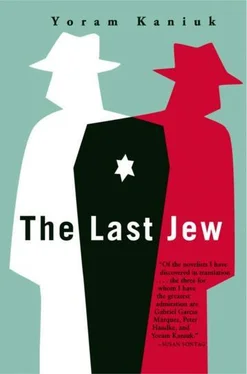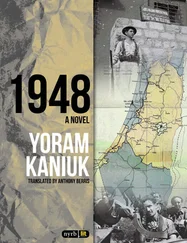From the day Boaz was mobilized until the war was over, Rebecca Schneerson sat pinned to her chair. My men die too much, she thought. She wasn't really interested whether Boaz wanted to or not, she decided he would return and she recited Psalms. Some nights she shouted the verses and other nights she whispered them. Today she got up from her chair. She knew Boaz was coming back home. And Boaz is walking on the path, evening has fallen now, the no-threshing floor in the distance. One summer when he worked in the Burial Society to understand "what life is woven of," he sat with Tova Kavenhazer on the threshing floor. She was quite beautiful then. They hugged and he pressed against her and she felt his eyes penetrating her body through her dress, and then he told her about Nimitz's body, how they embalmed it, washed and wrapped it in a tallith, and Tova Kavenhazer jumped up in alarm, pushed his hands aside, and yelled: With the hands you embrace dead bodies, you embrace me? And he thought, With the hands I embrace her I embrace dead bodies, and ever since then he often pondered that sentence. She ran away. I was left with the thoughts, embracing dead bodies and embracing Tova Kavenhazer… She yelled: Don't you dare touch me, Boaz Schneerson! Later she married a shopkeeper from Akron who sold bootleg vodka.
When he entered the house, the Captain stood up, saluted, hugged Boaz, shook his hand, and left. Boaz put the kitbag on the ground and looked at Rebecca. She moved her hands a little, almost said something, but didn't. Behind her, through the screened window, the skeletons of almond trees were seen and the moon was starting to light the roof of the cowshed. They looked at one another and her mouth became soft and yet it was firm, and then he took a step toward her, his body rigid, stuck to the center of gravity in a space he didn't know yet, regulated by glory, and hit her hard. The accumulated rage pitched the old woman aside, dropped her to the ground, and Boaz trampled on her and from the window of Ebenezer's house, the stunned Captain peeped out. In the distance music came from a radio, the Captain who was afraid to interfere, tried to move so as not to see anymore. Rebecca lay on the ground, her body heavy and shrunken, her lips rounded, and a strange smile on the opening of her lips. The lips seemed stuck to her mouth. The lamp moved from the blow and then stayed still, murmurs of pain were heard, Boaz kicked her again and she shrank up and growled, but the smile didn't depart from her mouth, a thin slit of abomination popped up and vanished, and then the slit was filled with blood that flowed like a chameleon, and in the pain a groan of laughter was heard. The old woman lay shriveled and laughing; jets of blood burst from her face and her wide-open eyes.
Boaz went to the window, hit it, and yelled: That's not for you, Captain! And when the Captain took off, he made out the curbstones of the path and for a moment something the Captain had once told him flashed in his brain: Your mother built the path, and he asked then, Who, Rebecca? And the Captain said, No, Dana, and for the first time in his life he felt a longing for a stranger and hated himself so much. Boaz turned from the window, an oppressive compassion lay on him, he picked Rebecca up off the floor, sat her in her chair, brought a bottle of cognac, washed her face, and then kissed her wounds. She sat silent, blood still gushing, smelling of flowers, cognac, and sweat, she picked up the flyswatter that had fallen, wiped her dress, and since she couldn't yet talk, she pointed to her purse on a small chest of drawers next to the door, and Boaz handed her the purse, she opened the purse, rummaged around in it, took out a brush, undid her long hair from the pins that were trying to hold it, and started brushing it. After her hair was smooth, she got up, went to the bathroom, turned on the faucet, and let a stream of water flow on her face for a long time. Then she wiped her face, went back and sat down in her easy chair, and Boaz looked at the beautiful woman who had smeared a little powder on her face, stretched it, put the black scarf on her back, and said: A new state you've got, every Negro's got a state, Indians in movies have a state, Charlie Chaplin has a state, my grandfather's grandfather didn't have a state, but he was wise and didn't stand at attention every day at flags, like stupid Eve. I came back, said Boaz and didn't know what to say.
I waited for you. I went to the settlement. There's a new watchmaker there, came here a few years ago. Hung up a blue and white flag, stood there in the sun and sang one of Joseph's songs. They've got ministers in top hats, like Stutberg's automobile! Nehemiah knew when to die and where, on the border! They made themselves an army of Mr. Klomin and the Captain, won a state from some Arabs who didn't know the shape of a pogrom and don't know on what side you write what they never could read and made a state for Ben-Gurion, Princess Elizabeth, and Shirley Temple! So what? Did you fight for them too? You look tired, it was hard to bring a state to the people of Israel? Maybe you're hungry. Eat something, Boaz.
But what does all that have to do with Stutberg's car? he asked.
His automobile, when he brought it, everybody came to admire. It was a first auto. He opened the hood of the motor and everybody, Horowitz the dummy, Nathan Nehemiah's friend, and even Holtz who later married somebody who was almost your mother and didn't talk, even he stood there with a kippah on his head and admired, and they said: A motor that drives a cart like ten horses, ten kilometers an hour! All the insides of the auto were outside, now they look at the insides of the Jewish state, what a wonder! The Jews have a state too.
Eat something, she said.
She made a theatrical gesture that amazed Boaz. She stretched out her hand and her last word rang like a period and not a question mark, not an answer, not a suggestion-a gesture. She reached out her hand, her face became tender, and yet, as always, some thin thread of chill malice was stretched on her face and the blood still flickered from invisible scratches and Boaz felt his feet stagger, went to her, sat down on her solid lap and she hugged him, laid his head on her chest, and when he tried to weep, whimpers blurted out of his mouth like the whimpers of the jackal in his childhood when the settlement was girded by whimpering jackals and at night he would listen to them and try to understand their shrieks.
She stroked his face with her thin hands, kissed his neck, and whispered: I had to, Boaz, it was one night, I sat here in the chair, it was dark, the generator wasn't working and the civil guard walked in the street wearing berets and yelled to put out the light. In the distance, machine gun shots were heard from Negba and I felt in my flesh how Boaz in the mountains, is stabbed, shot, almost dead, eyes shut, I saw vultures, vultures with your eyes, Boaz, vultures, beaks of death, I aimed the words into the sky, to the river that throbbed, to Secret Charity, and I recited Psalms in an ancient melody, and you walked between the bullets, and you lay down and didn't die, I stopped, I stopped short, the vultures wanted your flesh, the eyes, the words stuck to you, you lay in my words, and a few hours later, something happened, I don't know what, I fell, as I fell before when you hit me, I drank blood, and Ahbed, the grandson of Ahbed, was scared, he didn't leave with the other Arabs and stayed, he yelled: You fall, Madame, they see blood in the dark, too, the window was open now, I was full of blood, I said to him, Shut up, Ahbed, and you ran, and you fled into the mountains, I had no choice, Boaz.
I know, he said.
Later, they told me there was a battle in the Old City and you died. I said you didn't die. People came from the settlement. They said, I have a grandson there, recite Psalms for him, what could I say? My Psalms don't belong to their grandsons. Hillanddale and God's Joy lost a grandson, what could I do? My Psalms weren't meant for their sons and grandsons… In our city there was a woman who went mad. People came and tried to get the madness out of her with fire and sulfur and they couldn't. She was possessed by the spirit of a heretic who ran away to Germany. They tried spells and it didn't work. She shrieked and her eyes burned, they raised heavy smoke and it didn't help. Need connection, they said, need connection. They said: a false messiah is eight hundred and fourteen and Joshua son of Miriam is eight hundred fourteen, but it didn't work, not even Shabtai Zvi. Didn't work, they blew the shofar, and said Lord King and pass away and the spirit didn't leave. They shouted, Out evil one, and then they said, There's Rebecca there, bring her. They clothed me in a gown and scarf so they wouldn't see my face and they took me. I used to sleep with my eyes open back then. I said to the man, Out evil one, come to me, I was beautiful, come hug me, the rabbi was scared and blocked his ears, didn't want to hear, I said I'm yours, I thought about the river that would make me pregnant some day, and the spirit left, I felt it strong in my body, a piece of him stayed in me, didn't leave, I spat and then he was scared and part of him ran away. They saw the window opened and he flew, you think those are tales, but he flew, then I left, they wrote his name on an amulet and the man came back, because they didn't write the name of the woman on the amulet, but by then I wasn't there and after eight days of the circumcision, she died foaming at the mouth.
Читать дальше












